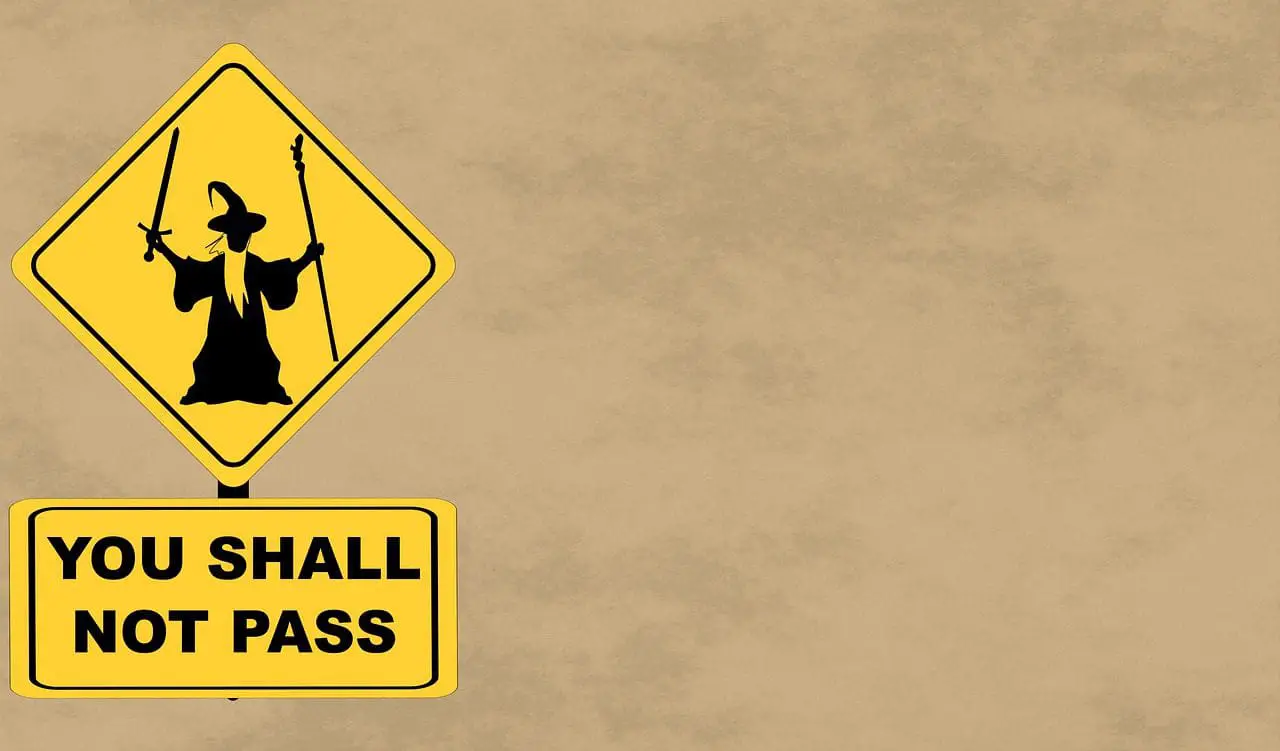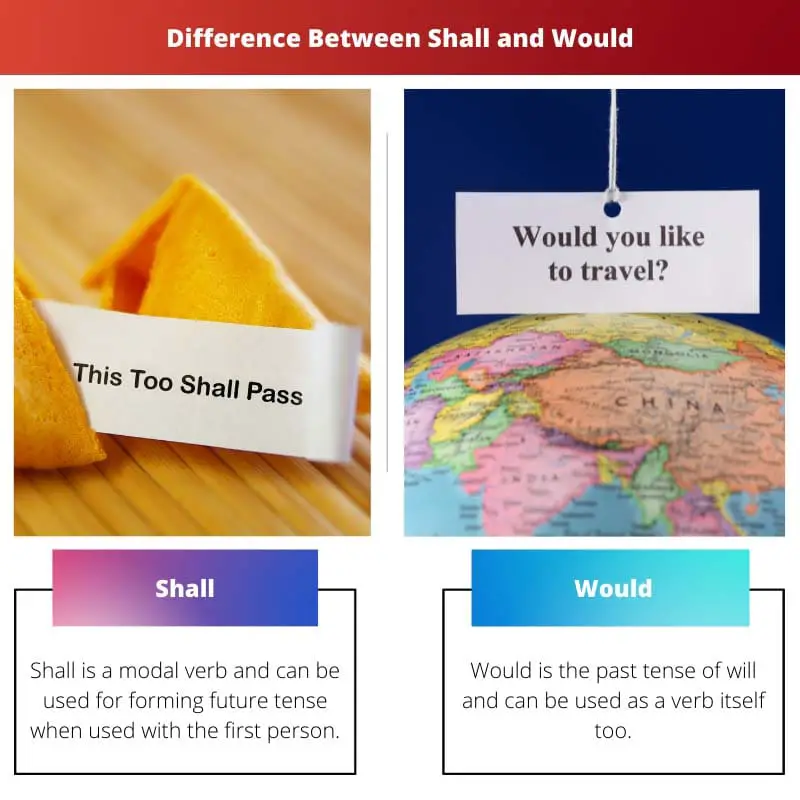English is a global language, and one must have a basic sense of it to communicate in a majority of spaces. Primarily, both shall and would are verbs used to indicate future events in a sentence, but they can be used for other purposes as well.
Key Takeaways
- “Shall” indicates future actions, obligations, or intentions and is more formal.
- “Would” expresses hypothetical situations, past habits, or politeness in requests.
- Both terms are modal auxiliary verbs, but their usage depends on the context and desires to mean.
Shall vs Would
The difference between shall and would is that shall is used for expressing instructions, commands, suggestions, and strong assertions. However, would is used to express desires, polite requests, opinions, wishes, or regrets.

Shall is a modal verb and is used to express future tense. Though, it must be used in the first person to express future events. It is majorly used in British English. It is replaced by will in the modern world, but it is still majorly used in formal circumstances.
Would, on the other hand, is the past form of will but is used in various other circumstances. It is a modal auxiliary verb used to express any past event or describe any future event in the past. It is also used to express the conditional mood.
Comparison Table
| Parameters of Comparison | Shall | Would |
|---|---|---|
| Definition | Shall is a modal verb and can be used for forming future tense when used with the first person. | Would is the past tense of will and can be used as a verb itself too. |
| Verb Type | It is used as an auxiliary verb or modal verb. | It is used as a modal verb. |
| Tense Type | It is a future form of tense. | It is a past form of tense but it is used in future scenarios as well. |
| Indication | It indicates obligation, suggestions, or instructions. | Indicates polite requests, opinions, desires, or requests. |
| Sentence Usage | Shall I send back the watch? Every child shall succeed in the game. | I would love to go to your place. I would imagine that they are home by now. |
What is Shall?
Shall is an auxiliary modal verb, and it indicates the reference to the future in a sentence. It is used in the first person if the future tense is used in a sentence. Its usage indicates the formalness of a scenario.
Such as, I think I shall be busy tomorrow, given the current circumstances.
Other than that, it is used in other contexts as well. It is used to express assertions or strongly express one’s intentions. For instance, you shall receive all the love that is owed to you.
Its usage differs while questioning or offering suggestions. For example, shall we host a party? Shall I help you with the laundry? Where shall we meet today? Shall be used for offering help, and it indicates politeness.
The questions posed in the formerly stated examples show different usage of shall. The word has been used to offer help, suggestion, and advice.
It is also used to express the determination that something will happen. There is a sense of strong assertion in such sentences. For example, we will study hard and shall succeed in the exam.
Shall does not have any participles and infinitive forms. It is used to form the future tense of another verb, but it does not have a future tense of its own.
Though, it should is used sometimes as the past tense of shall.

What is Would?
Would is an auxiliary verb and is sometimes used as a modal auxiliary verb. Primarily, it is used to talk about the past.
It is a past form of will, but it is also used as it is to express different scenarios. As an auxiliary verb, would is invariable, and it goes only its one form.
It is also used to express the past tense of will or going to. In reported speech, would is commonly used as the past tense of will or going to. For example, I thought it would not rain, so I did not bring my umbrella.
Would is also used for expressing the future in the past. In other words, it is used when talking about the past and expressing something that has not happened at that point in time.
For example, she intentionally missed the party, unaware that she would meet her long-lost friend there.
It is also used to express conditionals in a sentence. For instance, she would be expelled if they identified her; if I had the money, I would have gone on the trip.
In the same structure, it is also used to advise someone. Such as ‘I would not do that if I were you.’

Main Differences Between Shall and Would
- Shall is used to indicate the present tense in a sentence but Would majorly indicate the past form.
- The use of shall indicates obligation and formality but Would is used in informal conversations, making sarcastic comments and polite requests.
- Usage of would indicate more politeness, whereas shall indicates formality and therefore, it is used in courts.
- Shall is the base form, and its past form is should, whereas would is a past form itself, and as a modal auxiliary verb, it does not have any other participles. But it is the past form of will.
- Shall is used to indicate future or sometimes present events in a sentence but would is used for past events or imaginary events, or conditionals.

- https://www.degruyter.com/document/doi/10.1515/9783110895339.267/html
- https://www.jstor.org/stable/2918384
- https://heinonline.org/hol-cgi-bin/get_pdf.cgi?handle=hein.journals/scrib3§ion=13

The article demonstrates the subtle yet distinct differences between ‘shall’ and ‘would’ in various contexts.
The section explaining ‘shall’ in offering suggestions and advice is insightful.
The examples provided for the use of ‘shall’ and ‘would’ are very beneficial in understanding the context.
The explanation of ‘shall’ and ‘would’ when used in questions is especially insightful.
The detailed explanations of ‘shall’ and ‘would’ in different scenarios provide a valuable understanding.
The article meticulously dissects the usage of ‘shall’ and ‘would’ in sentences.
The in-depth explanations showcase a comprehensive analysis of ‘shall’ and ‘would’.
An articulate comparison between ‘shall’ and ‘would’ based on different contexts and usages.
The clear distinctions provided between ‘shall’ and ‘would’ are commendable.
This article offers clear insights into the varied usages of ‘shall’ and ‘would’.
This article provides clear examples to differentiate the uses of ‘shall’ and ‘would’.
The use of ‘would’ in reported speech made the explanation very comprehensive.
I found the explanation on the use of ‘shall’ to express determination very enlightening.
The article thoroughly explains the nuances of the usage of ‘shall’ and ‘would’.
Indeed, the article offers a clear understanding of these two modal verbs.
The comparison of ‘shall’ and ‘would’ through various parameters is very helpful.
The article’s explanation of ‘would’ as a modal verb is noteworthy.
I appreciate the detailed comparison table which effectively depicts the differences between ‘shall’ and ‘would’.
Well-structured content clarifying the precise uses of ‘shall’ and ‘would’.
The detailed explanation of ‘shall’ as a future form of tense is particularly significant.
The content accurately elaborates on the varying indications of ‘shall’ and ‘would’.
A clear explanation of the uses of ‘shall’ and ‘would’ in different scenarios. Very informative!
I agree, the comparison table is a helpful visual aid
Precise explanation of the meaning and context of ‘shall’ and ‘would’
A well-structured breakdown of the usage and meaning of ‘shall’ and ‘would’.
The article effectively captures the context-based usage of ‘shall’ and ‘would’.
The article’s illustration of the use of ‘would’ in expressing conditionals is very informative.